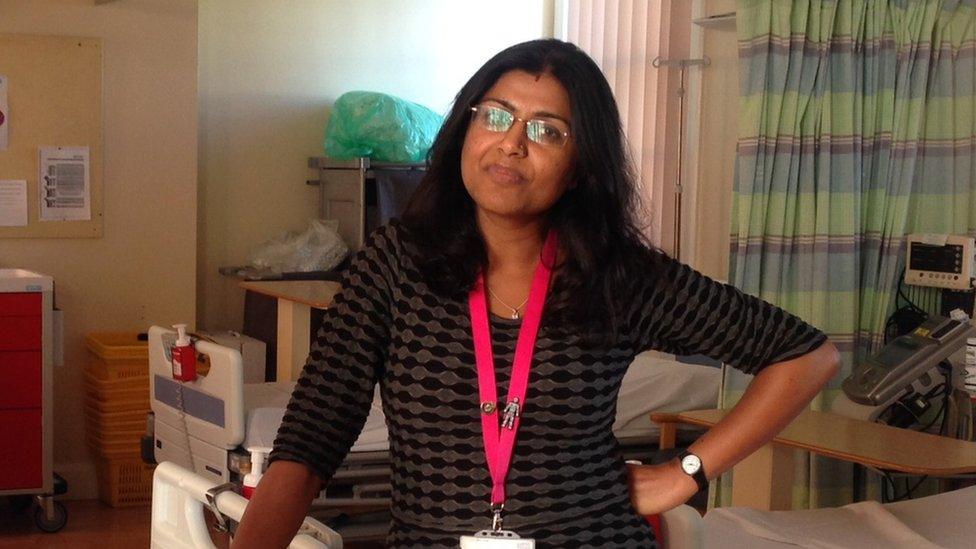Female surgeons face 'hostile environment''
- Published

Operating theatres are a "hostile environment for women", one of the country's leading female surgeons has told the BBC.
As editor of the magazine Medical Woman, Jyoti Shah said several female surgeons had spoken to her about sexism being a problem.
She has called for a cultural change.
Meanwhile, the first female president of the Royal College of Surgeons, Clare Marx, said there needs to be a focus on developing women's careers in surgery.
Ms Shah, a consultant urological surgeon at Burton Hospitals NHS Foundation Trust, said women in her field faced sexism every day because it was engrained in surgery: "Surgery still remains very male dominated, and it does still appear as an old boys' club and you're very much an outsider as a woman.
"You're trying to break into their gang almost, and that culture is quite engrained in surgery."
There are approximately 800 female surgical consultants in England, and they represent only 11% of the total.
Even though the number of women has been increasing year on year, it has been a gradual process.
A 2013 survey of newly qualified UK doctors , externalsuggested that 68% of the female ones believed surgery was not a career that welcomed women.
According to research by Exeter University, women could be discouraged from entering surgery because there are fewer female role models, and a perception by some that they are less likely to succeed than their male counterparts.
Attitudes
Ms Shah believes the problem is partly down to a hierarchical structure, which she says is dominated by men in senior positions.
She told the BBC: "I know one woman who as she was operating, she leant over and the consultant whom she was operating with very gently brushed against her breast.
"More subtle forms are being referred to as 'the nurse', being in a meeting with men and being the only woman and you're asked to make the tea.
"There needs to be a cultural change so that women don't feel uncomfortable or inferior," she said.
Sexist abuse
The first female president of the Royal College of Surgeons (RCS), Clare Marx, said there was a gender inequality in surgery.
But she said the culture was already changing and that was reflected in the growing number of women going into medicine.
She said: "We can't tell people to change their culture, what we have to do is grow the numbers and show the way we can change the culture from within rather than dictating.
"Laying down rules doesn't work.
"We have started an emerging leaders programme, which is a pilot, and what we've done is put out applications to women who are interested in leadership, and from the applications we're trying to bring them into the college and talk to them about their futures - their leadership roles - and their various issues about their career."
Saving lives
Becoming a surgeon takes can take up to eight years after graduating from medical school. The RCS said the length of training could put some women off if they were keen to have children.
Some surgeons argue that Ms Shah's claims of sexism are hyperbolic and that humorous banter is being wrongly interpreted.
Ms Marx said there was fine line between a joke and sexist abuse.
"We have to be very careful that there isn't a confusion between a manner of speaking and something that is rightly offensive," she said.
Best talent
But Ms Shah firmly believes there needs to be an overt cultural shift in surgery or the field will miss out on employing the brightest recruits.
She said: "This is about saving lives and recruiting the best talent possible, regardless of gender, we want to create an environment that is appealing to everybody - we owe that to patients.
"We need more discussion about it actually, maybe have discussion groups about it and say, 'Do you realise how the impact of that behaviour was on the rest of the team or on your colleague?'
"And the problem is a lot of this becomes the norm because it has always happened, and you know women start to accept it."